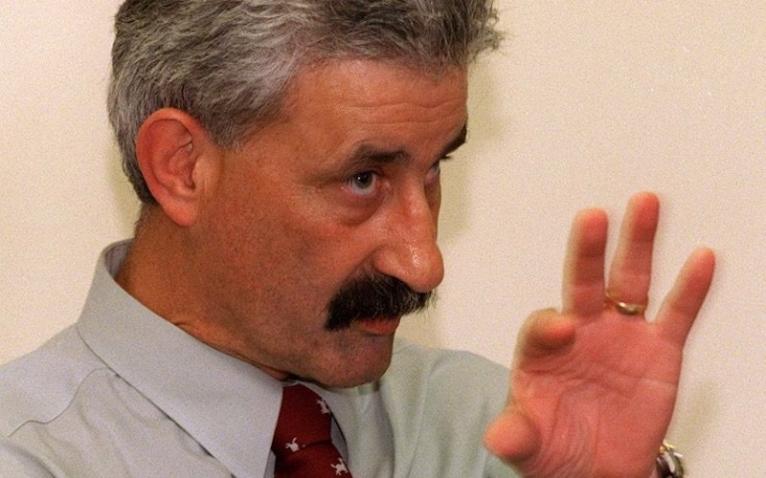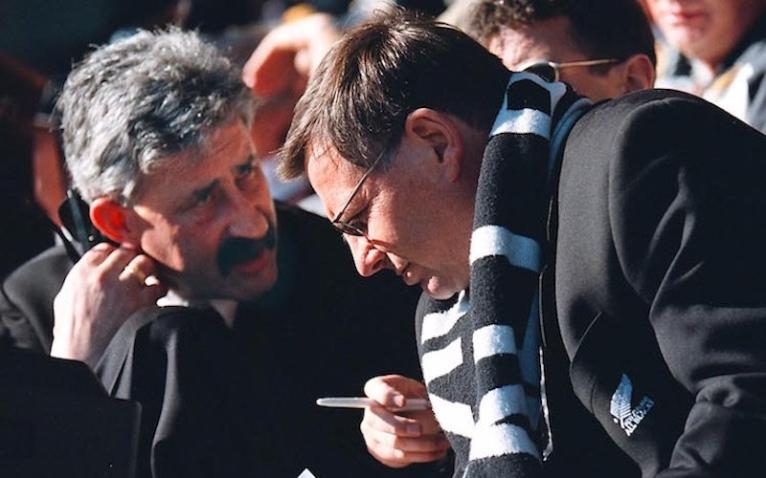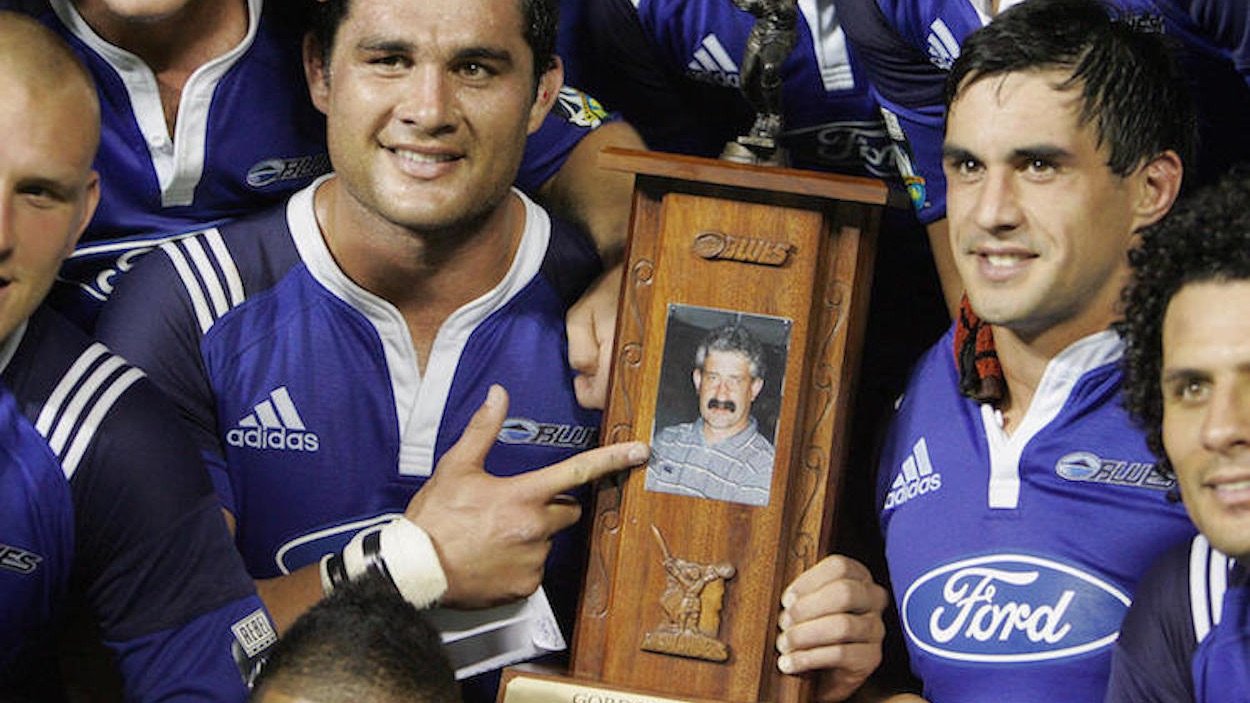Why the Gordon Hunter Memorial Trophy is a special piece of New Zealand rugby silverware

Gordon Hunter was a detective – a very good one according to everyone who worked with him and not a few who were put away by him. He was also one of the most memorable rugby coaches of his, or any, era. This weekend the Highlanders and Blues will contest the trophy named in his honour. Here’s why that matters, and why his memory deserves to be kept alive.
It was a fine winter’s Friday in Christchurch, mid-morning, when the policeman’s phone rang. The voice on the end of the line was familiar to him, the words clipped and to the point, delivered with an unmistakable accent that rose and broke, rose and broke.
“Suspect. Shaved head. 2pm. Cathedral Square.”
Then the phone clicked dead. At 2pm that afternoon, the policeman was parked in his police car in Cathedral Square when there was a knock on the passenger window. It was a man with a shaved head.
“How can I help you, son?” Enquired the officer, as he wound down the window.
“I’m here to confess to a crime,” came the reply. “But I’ll only talk to Detective Hunter.”
“Well, you better get in the car then, son.”
Once at the station the policeman explained to the Sergeant that the man in his custody wanted to confess to a crime, but that he did not know what the crime was, or when it took place.
“What are you here to tell us, lad?” barked the Sergeant.
“I’ll only talk to Detective Hunter,” said the man.
“Detective Hunter works in Dunedin, lad, not here in Christchurch.”
“Well, you better get him on the phone.”
The Policeman called Detective Hunter.
“Speak!” the Detective barked down the phone.
“We have your man at the station but he’ll only talk to you.”
“I guess I better come to Christchurch then,” he said to the policeman. “I’ll be there in five hours.”
To this day, no one really knows who that man with the shaved head was. No one can say for sure if any crime was committed at all, no one is sure about anything other than this: five hours later Detective Hunter walked into a police station in Christchurch, briefly chatted to the suspect, released him immediately and then, upon conferring with the policeman who had snared his catch, decided that while he was in town he best stay up for the Canterbury game at Lancaster Park the next day. Be a shame to have wasted the drive.
The policeman in question was a man named Steve Hansen.
Apocryphal or not, that is one of the many stories of Gordon Rowland Robert Hunter – Gordy to everyone who knew him or played for him. Steve Hansen first played for Hunter on a combined services trip to the UK, and had enormous respect for him as a man and as a coach. On a freezing evening in Invercargill a few years ago, he told us the above story, and many others. Our stomachs were in pain the next day from laughing so hard.

There was the time he made the Combined Services team get dressed in their number ones because they were going to have a photo with Queen Elizabeth. He got them organised, marched them down to the gates of Buckingham Palace, arranged them tallest to shortest and then asked a Japanese tourist to take the photo. With the tourist’s own camera.
Once the bewildered tourist had snapped the shot, Gordy ordered the team back to the barracks and on to training.
“But Gordy,” one of the backs complained. “I thought you said we were having a photo with the Queen.”
“She was in the window,” was his reply.
No member of the team has ever seen the photo, but wouldn’t it be nice to think that on a wall in an Osaka Apartment, there is a framed picture of that New Zealand Combined Services team and an elderly man sitting there looking at it, still telling some manufactured story about why he has that photo in his living room.
There was the time he arrived in Invercargill at the home of the Wilsons. A young blonde boy opened the door and standing before him was a moustachioed man with a glass eye.
“Here to see your parents boy,” he barked.
The young man let him in, called for his mum and dad and then sat in the lounge while Gordy and the folks talked in the kitchen. Approximately 25 minutes later, Gordy walked out, stopping only briefly to shake the boy’s hand.
“See you in Dunedin, lad.”
And that was it. Jeff Wilson was heading north.
[rugbypass-ad-banner id=”1473723684″]
There was the time he called a young Temuka player by the name of Brendan Laney into his office.
“Sit!” he barked at the bewildered kid.
He turned in his chair and gestured at a whiteboard upon which were written the names of the Otago Higlanders midfielders. Names like Marc Ellis and John Leslie. Laney watched as Gordy wrote his name below the others on the list.
“They’re all ahead of you,” Gordy told him. “Nice meeting you.”
That was the end of the meeting. Many years later, when Laney headed to Scotland and Gordy began his battle with cancer, he stopped at his old coach’s house with a six pack of beer. They didn’t touch the grog but they sat around for a chat. The coach had one last piece of advice.
“Wear a backpack,” he said. “Always pays to keep your hands free.”
There was the time he coached an Otago selection against Sassenach side. After the match, both teams gathered in the changing shed for a ‘court session’. The visiting captain laid down the rules for the initial round of drinking.
“You each come up, put one hand over one eye, say three words, and drink your beer.”
The Otago lads all shot a glance at their glass-eyed coach who stood at the back with the usual steely look on his face. The temerity of this bloke, they thought, to come into Gordy’s shed and take the piss out of his glass eye.
Rules were rules, however, and each and every player made his way to the front of the room, placed a hand over one eye, conjured three words, and necked their cans.
And then it was Gordy’s turn. A hush fell over the shed as the coach made his way forward. He stood there and took a moment to eyeball the room. Then he turned to the front, placed a hand over his good eye, and with his three words he said, “Fuck it’s dark.”
There was the time Highlanders first five Tony Brown turned up under the weather to a training session at Tahuna Park. Halfback Stu Forster thought it would be funny to throw his passes a metre or so in front of the ailing Brown, just to watch him struggle. Brown dropped the first one. And then the second. And then the third.
When he dropped the fourth, Gordy had finally seen enough. From his position under the goal posts he roared at his hungover charge.
“Tony! I don’t know who she is, but she’s got to go!”
She went.
This Saturday night, the same Tony Brown will be head coach of the Highlanders for the first time in a Gordon Hunter Memorial match. There will be no shortage of motivation. The Highlanders have held the trophy since 2012 when they beat the Blues 27-20 at Eden Park. They will be looking to make it five straight wins in the Gordy match this weekend.

Adding to the occasion on Saturday is the fact the trophy was not contested last year at all. The rules of the fixture dictate that the holders must put the trophy up only in their home game. The Blues and Highlanders met just once last year, at Eden Park, and the trophy stayed in the cabinet in Dunedin. The two sides have already met once this year, with the Highlanders holding off a late charge to clinch a 16-12 win in Auckland. The Blues have not won a New Zealand fixture away from home since 2013.
Gordy Hunter would have loved watching the Highlanders play their helter-skelter rugby under the roof at Forsyth Barr Stadium. He may have been a Southlander by birth but he was an Otago man at heart. As New Zealand Herald columnist Chris Rattue noted in his 2002 obituary of Hunter, “Laurie Mains may have given Otago teams structure and led them to a title in 1991, when Hunter was his assistant, but Hunter gave Otago flair.”
The mischievous Marc Ellis always called Gordon Hunter ‘The Riddler’, but there was nothing overly complicated about him. In essence, he was a coach who loved the game and even more so the boys who played it for him. He was the Detective who left his own fingerprints on New Zealand’s national sport.
This weekend men like Laney and Wilson, Ellis and Brown will get to think of their old coach and friend once more. Hopefully, the players in both teams will be able to sit around and listen to some of the stories about Gordy. Hopefully, they will laugh at the tales and then go out on Saturday and play with flair and pace and a sense of joy. The way Gordy expected his teams to play.
If you believe in the afterlife, then you will know Gordon Rowland Robert Hunter watches still.
At least out of his good eye.























































